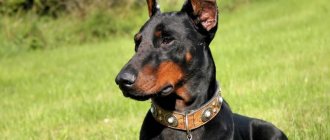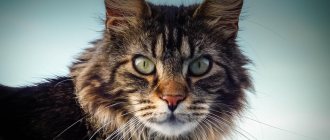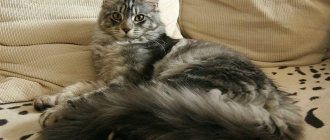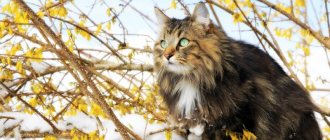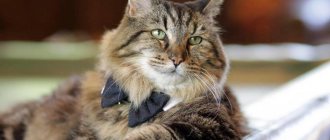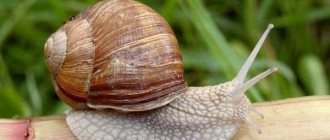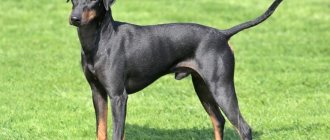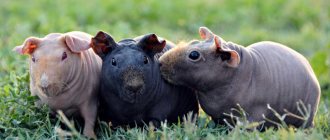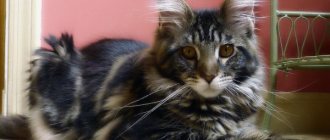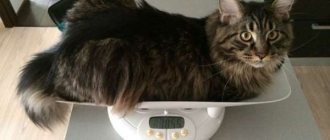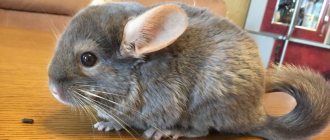It is enough to enter the query “Maine Coon” in the search engine, and photos of mustachioed beauties of the most diverse coat colors will immediately appear, which are captured in the hands of the owner. I must say that the photos of a Maine Coon with a person are really impressive.
Photo: Maine Coon in the arms of a person | Dreamstime.com
The powerful structure of a long body, thick hair, large ears with lynx tassels, intelligent eyes are just some of the external features of Maine Coons that distinguish these cats from many animals of other breeds. Let's try to figure out how Maine Coons themselves feel about their master's hugs. To do this, you will need to find out what the temperament of these large fluffy cats is.
Origin, description and appearance (colors)
Maine Coon big cats are native to northeastern America, Maine, home to loggers and gold miners in the past.
Maine Coons are excellent hunters and rat catchers
And these people cultivated animals to match themselves - strong and hardy , capable of surviving in the wild in cold and harsh winter conditions with meter-long snowdrifts and drifts.
Cats of this breed can reach a weight of more than 8 kilograms, cats are slightly smaller - up to 6 kilograms, length from nose to tip of tail up to 120 centimeters, height up to 41 centimeters.
Big Maine Coon cats, unlike the rest of their brothers, grow and develop slowly, reaching full maturity at about 5 years.
Description of the breed:
- large body with well-developed muscles;
- wide chest;
- strong paws with tufts of hair between the pads;
- large head with a wide nose and massive chin;
- tail covered with long airy hair;
- tassels on pointed ones.
The silky and shiny coat with a thick undercoat has water-repellent properties.
It is short on the back and shoulders, gradually becomes long on the belly, sides and tail, and on the neck there is a long frill.
The silky and shiny coat with a thick undercoat has water-repellent properties.
The Maine Coon breed standard allows for many colors; only chocolate, lilac and Siamese are not allowed.
Possible colors:
- white,
- black,
- cream,
- blue,
- smoky;
- leopard print
Striped and tricolor varieties are acceptable.
Eye color ranges from green to gold. Light-colored cats have blue and even multi-colored eyes.
Character of the breed and habits, characteristic features
Affectionate and calm, Maine Coons have a gentle disposition and a balanced character.
The Maine Coon breed standard allows for many colors
They maintain their independence, are restrained in expressing violent feelings, but are not averse to playing and frolicking.
Adult animals are independent and active , they do not like to bother or beg. They get along well with other pets, cats of other breeds and dogs, are patient and affectionate with children, delicate and sensitive to the mood swings of their owners.
The friendliness and good nature of Maine Coons will allow them to be kept in families with small children. Cats of this breed are not prone to aggression, are not jealous and are rarely in a bad mood.
They are neat and clean, and easily master the scratching post and litter box. The purr is more like a rough growl. They only speak up when they are unhappy or annoyed.
They easily tolerate the absence of people in the house; they will find something to do while the owners are at work.
Maine Coons are excellent hunters and rat catchers.
Care and maintenance
It is worth keeping a cat of this size in a large apartment or country house; small-sized housing is not suitable for large cats.
In addition, cats of this breed, due to their large size, consume three times more food than representatives of other breeds.
Be sure to read:
Caring for an amazing raccoon cat - Maine Coon
Care comes down to regular washing, combing and disease prevention.
Healthy Maine Coons cope well with personal hygiene themselves.
Once a year, the animal must be vaccinated against diseases such as:
- rabies,
- calcivirus,
- panleukopenia,
- rhinotracheitis.
Deworming and treatment against ticks and fleas should also be carried out according to the scheme. Even if the cat does not leave the apartment, eggs and larvae of parasites can be brought by the owners on shoes and clothes from the street.
Hygiene
Healthy Maine Coons cope well with personal hygiene on their own; owners are required to brush their coat once or twice a week. The procedure is performed with a metal comb and non-sharp rounded teeth.
The tail must be combed carefully and carefully; the hair on it grows slowly.
You can feed both dry food and natural food.
Wash the animal as needed, no more than once a month with a special zoo shampoo for long-haired cats. Mandatory swimming takes place before the exhibition.
Diet and feeding
You can feed both dry food and natural food; there are no special requirements or restrictions. If owners prefer dry food, then it should be premium and preferably specialized.
The natural diet of such a cat should consist of the following components:
- 80% meat and offal - boiled poultry, rabbit, beef, lamb, sometimes a little boiled sea fish.
- 20% vegetables and dairy products - carrots, zucchini, pumpkin, beets, cheese, cereals, eggs.
When feeding a cat natural food, it is necessary to give it vitamins.
When feeding a cat natural food, it is necessary to give it vitamins.
You should absolutely not give salt, sugar, spices, chicken and beef bones, smoked meats, sausages, chocolate, legumes, pork and fatty poultry.
You can also feed according to a mixed scheme - dry food as a base and a small addition of natural products.
Maine Coons love to play with water, so drinking dishes for them should be chosen with a heavy bottom, high edges and wide, so that there is less chance of spilling water.
Also, if possible, do not place water near the food so that it does not get wet and spoil.
Training and education
Training in the generally accepted sense for Maine Coons, as well as for other cats, will most likely turn out to be impossible ; it will not be possible to teach a cat to accurately follow commands.
But raising a pet and developing some of its play habits is quite possible, especially since animals of this breed are not prone to self-will and vindictiveness.
It is quite possible to teach a cat to respond to its own nickname and to come to the owner’s call. To do this, you just need to call him by name and show him a tasty bait, after a while the cat will learn that this is his name.
It is also quite possible to train him to fetch a toy during play, to give a paw, if you pay more attention to this, reinforcing your actions with tasty little encouragement.
Be sure to read:
Maine Coon: size and weight correspond to the age of the cat
To combat bad habits, you should use a rustling newspaper or a spray bottle of water - a frightened cat usually, after several times, perfectly remembers what actions should not be performed.
It is quite possible to teach a cat to respond to its own nickname
Life expectancy and typical diseases
Cats of this breed, with proper care and good nutrition, become true long-livers. The average life expectancy is 13-16 years.
Often cats of this breed exceed the twenty-year mark; the most famous cat, Velvet, lived for 27 years and was listed in the Guinness Book of Records.
The health of cats of this breed is good and is determined at the genetic level, since the breed is indigenous and not artificially bred.
To maintain health, such a large animal needs a lot of space and long walks in the fresh air are desirable. Large bones and muscles must be maintained in good shape, the cat must climb, run and jump.
If the animal does not participate in breeding work, then the decision to sterilize would be correct, since sterile animals have a longer life expectancy.
Diseases and pathologies associated with the cardiovascular system and the musculoskeletal system are hereditary for coons.
Feeding
You can feed the Maine Coon like other purebred cats. The only caveat is that Maine Coons are large and active animals, they need a high-calorie diet. And the daily feeding rate will be greater than for small and medium breeds of cats.
Both natural food and ready-made food are suitable for feeding Maine Coons. What to feed is up to you, but do not forget about the basic requirements: the diet must be balanced, contain vitamins and essential minerals.
Natural nutrition
If you choose to feed with natural products, you need to create a balanced diet of meat, fish, meat products, vegetables, dairy products, and vegetable oil.
The basis of the diet (80%) should be meat products:
- beef (peritoneum, cuts from the head);
- rabbit;
- turkey;
- chicken drumsticks and thighs;
- heart;
- chicken liver;
- chicken heads (without beak);
- chicken necks (without skin);
- stomachs;
- tripe (beef);
- lung;
- cockscomb;
- pork nickels;
- fish (salmon, trout, mackerel);
- seafood (squid, shrimp).
The remaining 20% comes from additives:
- vegetables: cauliflower, zucchini, carrots, pumpkin;
- quail eggs;
- hard cheese;
- dairy products;
- low-fat cottage cheese;
- bran;
- olive oil;
- dried kelp.
Experienced Maine Coon owners prepare a meat and vegetable mix from these products, package it in bags and place it in the freezer. One package – for one day. The daily norm is 250-300 grams.
Important!
With this method of feeding, you will need from 3200 to 5500 rubles for a month.
How to give natural products correctly
- Chicken necks are beaten with a hammer.
- Grind by-products in a meat grinder.
- Cut the meat into thin strips or pass through a meat grinder.
- Vegetables are grated on a fine grater. Served raw or stewed.
- Cheese is grated.
- The fish is cut into small strips.
- All meat and fish products are mixed, cheese, vegetables, a little kelp, bran, and cottage cheese are added. The resulting mixture is frozen in portions.
- Before serving, defrost the meat and vegetable mix and add olive oil.
- Fermented milk products can be added to a serving of food or poured into a separate container.
- Fish and seafood are given once every 5 days.
- Eggs 1 time every 3 days.
Feeding with industrial feed
The brand of industrial feed is selected individually. The only requirement is that the food must be for large breed cats. Preference should be given to feed of the premium, super-premium and holistic classes.
The daily feeding rate is calculated in accordance with the markings on the original packaging and depends on the age of the animal, its weight and activity. The average adult Maine Coon weighs between 7 and 10 kg. 65 -100 g required. feed per day.
The pet industry produces special brands of food for large cats that are best suited for feeding Maine Coons.
The best brands of feed:
- Orijen Cat Six Fish Grain Free;
- Acana Regionals Grasslands Cat Grain-Free;
- Carnilove Adult Cat Large Breed Duck & Turkey Grain-Free;
- Brit Care Tobby I'm a Large Cat – Duck & Chicken Grain-Free Hypoallergenic;
- Royal Canin Maine Coon.
Important!
With this method of feeding, you will need from 3100 to 6500 rubles. monthly.
Read about food:
- list of top cat food manufacturers;
- Hills cat food reviews;
- reviews about Royal Canin for Maine Coons;
- reviews of Akana cat food.
Breeding
Diseases and pathologies associated with the cardiovascular system and musculoskeletal system are hereditary for coons.
The breed should be bred by professionals in specialized nurseries.
Pedigree animals require careful selection of a pair, veterinary care, felinological education, communication with breeders and enormous material resources.
It is much easier to become the owner of a breeding cat as part of a cattery. The nursery will help you gain access to good quality animals for breeding and will assist in the sale of kittens.
Mating and partner selection
It is much easier to become the owner of a breeding cat as part of a cattery.
The search for a partner and mating of a breeding animal is carried out through specialized clubs. For regular mating, you can look for a partner at an exhibition or through an advertisement.
Animals younger than one year old should not be allowed to breed; it is optimal to postpone this until the third year of life.
Basic rules of mating:
- Mating takes place on the cat's territory, which gives him more confidence.
- It is advisable to trim the animal's claws.
- The cat should not be washed before mating.
- Both animals must have all necessary vaccinations.
Pregnancy and childbirth
Pregnancy in large cats is longer than in other breeds, lasting 9-10 weeks. Its duration depends on the number of kittens in the litter: the fewer kittens, the longer the cat bears them.
Coons usually give birth to offspring once a year, with babies in a litter ranging from 1 to 6.
If the owners do not have experience in giving birth to a cat, then it is best to negotiate with a veterinarian about the delivery.
Maine Coon vaccination
The first time the procedure is performed on kittens is at the age of 2-3 months. If a young Maine Coon lives with a breeder, the breeder provides veterinary care on his own and hands over the vaccinated pet to the new owners.
If for some reason the vaccination period was missed, the next time it is allowed to be done at the age of 8 months. This is due to the period of teeth change, during which the Maine Coon’s natural immunity is weakened and vaccination can cause unwanted complications.
Important! The specific features of the “street” keeping of Maine Coons (applies to animals that walk outside the apartment) include mandatory regular treatment for external and internal parasites.
Characteristics of this breed
Like cats of other long-haired breeds, coons need special care and attention during shedding.
Shedding
Shedding in cats occurs 2 times a year and lasts from 5 to 7 weeks. Animals lose a lot of fur. When your pet sheds, you need to scratch it at least three times a week.
Be sure to read:
What to feed a Maine Coon kitten: recommendations, diet from a month to a year, what not to give
The “wet combing” method is very effective during shedding. The animal is washed with shampoo, dried with a towel or microfiber, and the fur is combed out while wet.
Allergy
Maine Coons are no more likely to cause allergies than other cat breeds. An allergen for humans is animal saliva, and very rarely - wool.
Maine Coons are no more likely to cause allergies than other cat breeds
Cats themselves may be allergic to food, in which case you need to contact a specialist and choose something from a hypoallergenic line.
If the animal is on a natural diet, the owner will have to carefully monitor the animal, excluding foods of one group from its diet one at a time, in order to understand what the pet’s body reacts to.
Where to buy and how much does a kitten cost?
You need to buy a purebred kitten in nurseries or from trusted breeders, whose addresses can be found through the club.
Approximate cost of a kitten
You need to buy a purebred kitten in nurseries
. A purebred animal is expensive; show-class kittens intended for participation in exhibitions and reproduction of the breed can cost more than 100 thousand rubles.
Such a kitten has a purebred pedigree, which includes parents with show and breeding ratings.
The Brit class also has high prices - 30-35 thousand rubles. These are individuals with minor breed flaws that can be corrected by mating with a show-class cat.
Pet class are animals not intended for breeding, the so-called pets. The price of such a kitten is 15-20 thousand rubles. Pet class cats must leave the cattery already neutered.
The age of the kitten also affects the price. Kittens aged 3-4 months are considered the most valuable, because they easily adapt to new living conditions and are amenable to education.
The cost also depends on gender: males are more expensive.
What to pay attention to
If you want to get a kitten of this breed, you should carefully study all the documents provided by the breeder and be sure to show the animal to an experienced veterinarian.
Health
Maine Coons are distinguished by good health and endurance. They can live in harsh climates. Initially, this is a native breed, so it is healthy. Man himself, through selection, endowed animals with problems.
Diseases
Diseases in raccoon cats are the same as in other breeds. The following diseases are common:
- Problems with joints (purulent inflammation, arthrosis, dislocations).
- Cardiomyopathy.
- Spinal muscular atrophy.
- Tendency to urolithiasis.
Vaccinations
Maine Coons, like other domestic cats, require vaccination. Children aged 3 months and older are required to be vaccinated against rabies.
Vaccinations are also given for:
- panleukopenia (feline distemper, feline ataxia, infectious parvovirus enteritis);
- calicivirus;
- infectious rhinotracheitis (viral runny nose).
Deworming is a mandatory care item. The procedure is carried out once every 3 months.
